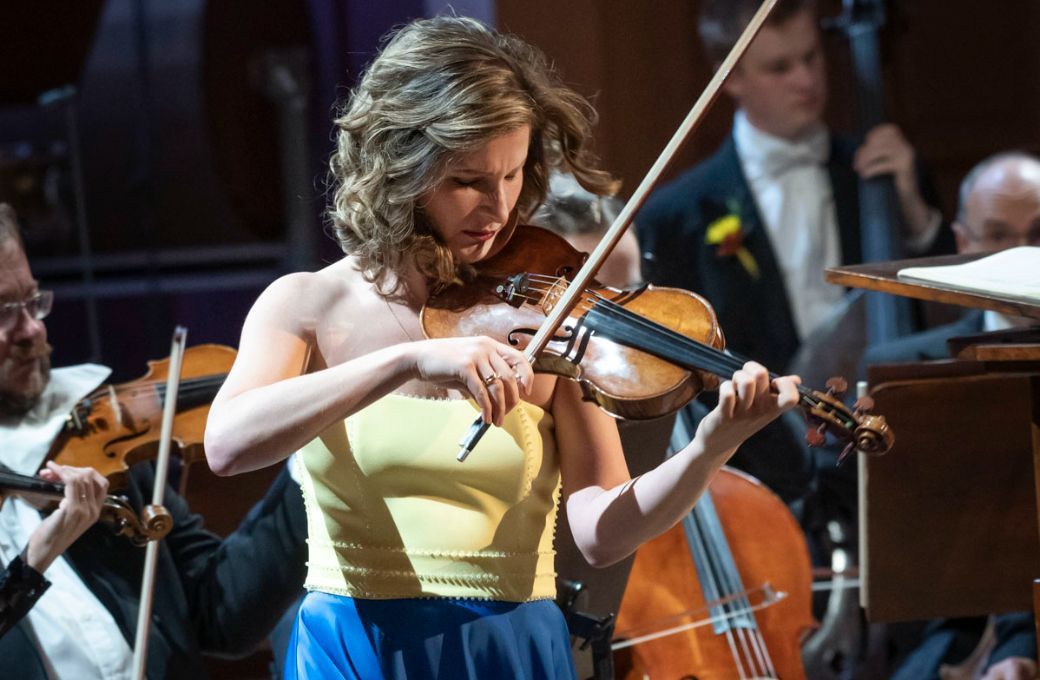“It is heavenly music that carries us away to another world,” violinist Lisa Batiashvili says of Beethoven’s Violin Concerto in D major, a description that neatly captures her performance of the piece with the Czech Philharmonic at the orchestra’s season opener. With Semyon Bychkov on the podium, the concerto cast a spell. The conductor brought the audience back down to earth in the second half with Strauss’ An Alpine Symphony, a different sort of journey – variegated, rugged and in its best moments, exhilarating.

For the soloist, Beethoven’s sole violin concerto makes great demands in both skill and sensitivity. Gauzy, ethereal passages alternate with lightning runs, most of which happen in the highest registers of the instrument. Just playing them without sounding squeaky is a challenge. Batiashvili pushed the limits on both ends, showing fierce technical brilliance in the cadenzas while maintaining a solid tone, and evoking ultra-fine textures in the atmospheric interludes that had listeners holding their breaths. The pianissimo passages were spun out like golden threads, delicate and captivating.
Bychkov matched that with a gentle approach in the orchestra, letting the music unfold and the nuances blossom, in particular the pastoral elements that prefigure the Sixth Symphony. The signature characteristics of Beethoven’s work were in place – the buoyancy, nobility and heroic overtones – but balanced nicely with moderate volume and emotional restraint. Those proportions preserved the spirit and depth of the music while giving it a light, transportive quality.
With the many pauses in the solos and fine gradations in the sound, this concerto does not work unless the violinist and conductor are perfectly in synch, and in that respect Bychkov and Batiashvili were outstanding. Her passion and his control, the fiery arpeggios framed by the refined melodic flow, created a tightly woven, richly detailed tapestry. The natural elegance in Batiashvili’s style added a fine gilding to the edges.
The orchestra more than doubled in size for An Alpine Symphony, bringing some unusual instrumentation into the mix – cowbells, a wind machine, a Wagner tuba. Bychkov sees the piece as not just a day’s hike, but a metaphor for life’s journey, and he crafted it as a monumental structure housing more episodes, epiphanies and layers of sound than it’s possible to absorb in a single sitting. The visuals alone were overwhelming, with epic skies, majestic peaks and raging storms emerging in rapid succession. Bychkov also took full advantage of the wide-ranging instrumentation, highlighting solos and sections from different parts of the orchestra to help build large spatial dimensions.
Details tend to get lost in this avalanche of sound, and it seemed a small miracle that Bychkov was able to elucidate so many of them, especially in opening up space for the soloists. He was also very effective in creating moods and atmospheres, conjuring moments of crisis and transcendence amid the tumult. That’s a lot to maintain over nearly 50 minutes, and by the end the sound was a bit ragged, with the brass sagging to a flat finish. By then, everyone on stage looked as if they had actually been on a taxing hike. Overall, though, it was an impressive performance that matched the geographical breadth and emotional landscape of the piece.
For all that, the emotional high point of the evening arguably came before the concert, when management announced that Bychkov had signed a new contract with the orchestra, extending his tenure as Chief Conductor and Music Director through the 2027-28 season. For an orchestra with its own history of joyful achievement and punishing setbacks, it’s a promising development on life’s unpredictable journey.


